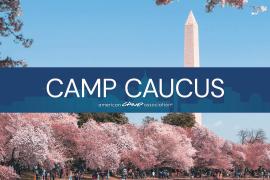I once heard the President/CEO of ACA, Tom Rosenberg, say that “We use camp to build good people." That really stuck with me.
In a way that hasn’t left me since and has also given a label to my most valued reason to love camp. As our collective societal culture has become less and less nurturing and more and more disconnected, I have grown in my appreciation of the value of camp. Camp — a place to create a bubble of utopia. A taste of the ideal. A reminder to the ancient ways of interconnectedness. And a living, breathing example of how truly dependent on one another we really are. I liken it to an aspiring pizza chef taking a trip to Italy to learn to cook. They only have limited time in Italy, but the things they learn can have ripple effects throughout their lives.
This past summer, we had a bit of an Olympic theme at our camp. Multiple competitive events where teams were against one another. And yet, I was blown away to see how many time a winning team quickly converted to cheerleaders for the other teams after they had won. We must have done something right because all throughout the session we were talking about a grand prize for the winning team, and after we announced the winner, no one asked about what the prize was! Truth be told, we hadn’t decided on a prize yet and were planning to make something up on the spot. Yet, the need never arose, because the campers were simply filled with the process. Kids, not caring about the prize. You can’t write scripts this good.
I do, however, want to be clear that campers and staff don’t simply arrive at camp and get off the bus ready to be model citizens. Tom Rosenberg is right: we build good people at camp. More appropriate to say we forge good people. Taking the metal that they are and often times by fire, helping them to reshape into the people they aim to be. In example, when there is an argument between two campers or drama building amidst several staff members in a cabin, we have to deal with it. The only way that problems don’t get out of hand is to be dealt with. We are not afforded the luxury in camp to go to our room and take space. Or take a few days and think on it. Or lose ourselves on the web to distract. Or jump in our cars and separate from the world. Problems must be dealt with, effectively and rapidly, to continue the positive momentum of camp.
Another great example of using camp for the building of good people is cell phones. After years of creating policies where campers and staff can or cannot use their cells in camp, we decided finally this year to take this topic head on and ban the use of cell phones by campers during their stay at camp. With the few exceptions of white noise in bed or to take pictures on the last night, campers had to turn their phones in at the beginning of every day to be locked away while they were out exploring the ways of pre-1995 youth.
The reaction at first was solid. A few parents and many campers expressed their less than favorable opinions. We stood strong and assured them that they would in fact survive the experiment. And while there were a few campers who acted as though something had been amputated from their bodies, the vast majority seemed to get into the flow within two days. And by the end of the week, we all felt as though it was a complete success — not defined by the idea that we had weened these campers off of their phone use in any permanent way, but more so that we had given them a small taste of what life is like without your phone. And the hopes were that the taste alone might lead to more frequent breaks from technology, and an increased awareness of the importance of connecting to three-dimensional people.
We were bold enough to try to use camp for more than just an amazing time. We chose to be intentional about teaching our participants qualities that would undoubtable serve them back in their lives, outside the bubble. I was always a very shy and reserved kid. And yet, I grew to become a camp director and public speaker.
Why, you ask? What entity created this mammoth metamorphosis? I can sum it up for you in four letters. C.A.M.P.
About the Author
Jonah Berger is the Camp Footprint director and national youth programs manager and member of the American Camp Association.
This blog is sponsored by Chaco.
Periodically, the American Camp Association (ACA) makes timely and relevant information about products and services available to its members so they can make informed decisions for their camps. However, the ACA does not endorse products, services, or companies.
The views and opinions expressed by contributors are their own and do not necessarily reflect the views of the American Camp Association or ACA employees.



